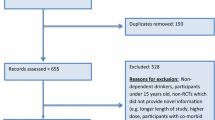Abstract
This case discusses Susan, a 20-year-old female college student with alcohol use disorder, and explores the practical considerations that should be taken into account when prescribing pharmacotherapy for alcohol use disorder in the adolescent and young adult patient population. It reviews the indications, mechanisms of action, dosing, and current evidence base for acamprosate, naltrexone, and disulfiram.
Access provided by Autonomous University of Puebla. Download chapter PDF
Similar content being viewed by others
Keywords
Susan is a 20-year-old female college student with an alcohol use disorder, who was recently charged with driving under the influence (DUI) . Over the course of the past year, she has blacked out on five separate occasions while intoxicated. After one of her blackouts, she awoke on an inpatient medical ward, where she was treated for alcohol poisoning.
A careful history reveals that Susan began drinking beer at the age of 15. Over the past year, her alcohol use has escalated from two to three bottles of beer (12 oz./bottle ≈ 5% alcohol) on one or two occasions per month to two to three glasses of distilled spirits (1.5 oz./glass ≈ 40% alcohol) 5 days per week. Her drink of choice is currently whiskey. She enjoys the smoky taste and usually has two to five glasses of whiskey after returning home at the end of the day. Her drinking has caused her to oversleep and miss class. On one occasion, she attended class while intoxicated. She often drinks before going out with friends, because she feels like alcohol decreases her social anxiety and allows her to be her “true self.” She wants to stop using alcohol due to her recent legal trouble, but is worried that she will not have the strength to resist her alcohol cravings.
Susan’s last drink was approximately 18 h ago, and her urine drug testing is unremarkable for other substances. On laboratory screening, her liver function tests are within normal limits, her creatinine is 1.0, and her glomerular filtration rate is >60 mL/min.
Considerations
What medications would you consider prescribing to Susan for alcohol use disorder? Which medication is the most appropriate at this time (Table 17.1)?
Since Susan does not live with her family or a partner that is involved in her clinical care, there is nobody to supervise, support, and reinforce disulfiram adherence at home. This lack of medication oversight limits the effectiveness of disulfiram in the outpatient setting [9]. While acamprosate appears to be effective in adults, its three times daily dosing can make adherence challenging.
Given Susan’s normal liver function, negative UDS, and recent alcohol use, her treatment team advises starting naltrexone. If Susan tolerates the oral formulation of naltrexone well, she will be offered naltrexone IM (Vivitrol®), which will likely facilitate medication adherence.
References
Plosker GL. Acamprosate: a review of its use in alcohol dependence. Drugs. 2015;75(11):1255–68.
Simkin DR, Grenoble S. Pharmacotherapies for adolescent substance use disorders. Child Adolesc Psychiatr Clin N Am. 2010;19(3):591–608. https://doi.org/10.1016/j.chc.2010.03.010.
Stahl SM, Grady MM, Muntner M. Stahl’s essential psychopharmacology: the prescriber's guide, vol. 1–2. 4th ed. New York: Cambridge University Press; 2014. p. 195–7.
Niederhofer H, Staffen W. RETRACTED ARTICLE: acamprosate and its efficacy in treating alcohol dependent adolescents. Eur Child Adolesc Psychiatry. 2003;12(3):144–8.
Fishman MJ, Winstanley EL, Curran E, et al. Treatment of opioid dependence in adolescents and young adults with extended release naltrexone: preliminary case-series and feasibility. Addiction. 2010;105(9):1669–76.
Lifrak PD, Alterman AI, O’Brien CP, et al. Naltrexone for alcoholic adolescents. Am J Psychiatry. 1997;154(3):439–41.
Deas D, May MP, Randall C, et al. Naltrexone treatment of adolescent alcoholics: an open-label pilot study. J Child Adolesc Psychopharmacol. 2005;15(5):723–8.
Niederhofer H, Staffen W. Comparison of disulfiram and placebo in treatment of alcohol dependence of adolescents. Drug Alcohol Rev. 2003;22(3):295.
Brewer C, Streel E, Skinner M. Supervised disulfiram’s superior effectiveness in alcoholism treatment: ethical, methodological, and psychological aspects. Alcohol Alcohol. 2017;52(2):213–9.
Author information
Authors and Affiliations
Corresponding author
Editor information
Editors and Affiliations
Rights and permissions
Copyright information
© 2019 Springer Nature Switzerland AG
About this chapter
Cite this chapter
Reiff, C.M. (2019). Case Study 6: Treatments for Alcohol Use Disorder. In: Welsh, J., Hadland, S. (eds) Treating Adolescent Substance Use. Springer, Cham. https://doi.org/10.1007/978-3-030-01893-1_17
Download citation
DOI: https://doi.org/10.1007/978-3-030-01893-1_17
Published:
Publisher Name: Springer, Cham
Print ISBN: 978-3-030-01892-4
Online ISBN: 978-3-030-01893-1
eBook Packages: MedicineMedicine (R0)




